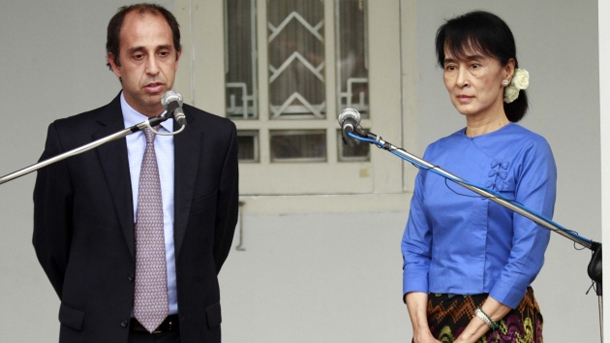The United Nations human rights envoy for Burma, Tomas Ojea Quintana, was in the Thai border town of Mae Sot on Tuesday to discuss rights issues with Burmese exiles and ethnic groups based in the area.
Representatives of 10 groups, including health care providers, refugee relief agencies, prisoners’ rights advocates, ethnic organizations and students’ and women’s groups, were present at the meeting.
According to sources who attended the consultation, a wide range of issues was discussed, including continuing conflict in ethnic areas, the ongoing detention of political prisoners, land confiscation, proposed refugee resettlement programs and landmines in former and current conflict zones.
Saw Albert, the field coordinator for the Karen Human Rights Group, said he told the UN envoy that any effort to repatriate refugees—many of whom have been in Thailand for more than two decades—should be carried out systematically and with guarantees for their safety and well-being.
He also added that despite the current ceasefire in Karen State, human rights abuses continue, albeit not in the same form as before, when civilians were routinely targeted by Burmese military offensives.
Now, he said, many are forced off their land by development projects that have been packaged as part of the “peace process” in the state.
Another major concern, he said, is the presence of landmines throughout the area, where conflict has raged for more than six decades.
Others expressed concern about the uncertainty surrounding the future of refugee camps in Thailand, which house around 160,000 people displaced by fighting between the Burmese army and the Karen National Union. Since Burma launched its reforms last year, many say that aid has shifted away from the border into projects inside Burma.
“Cutting humanitarian assistance to the refugee camps is also a form of human rights violation,” said Dr Naing Aung of the Forum for Democracy in Burma.
One problem with cutting back on funding for the camps and other projects on the border, he said, is that it is still far from clear if reforms inside the country are irreversible, and if they will bring a real improvement in the rights situation.
“Civil society groups should pay closer attention to the ceasefire process and the international community should set up a body to monitor whether or not human rights violations are continuing,” said Naing Aung.
Another issue raised at the meeting is the continuing detention of political prisoners. Bo Kyi, the joint-secretary of the Assistance Association for Political Prisoners, said his group informed the UN envoy that there are still 442 detainees in Burma’s prisons for political offenses.
Besides issues affecting political dissidents and ethnic minorities, there are also widespread abuses against farmers and workers, who make up the vast majority of the country’s population. Quintana heard how land confiscation has become a growing problem in rural areas amid increasing domestic and foreign investment in Burma’s economy, while workers who strike for higher wages face dismissal.
Quintana’s trip to the Thai border follows a fact-finding mission to Arakan State, where clashes between ethnic Arakanese Buddhists and Rohingya Muslims have left dozens dead and tens of thousands homeless.
Before starting his week-long visit to Burma, the UN envoy said that the human rights situation is still a major concern that demands much closer attention. He made the same point during his visit to Mae Sot.
“Mr Quintana said that the international community is paying much more attention to the current reforms than to the human rights situation,” said Naing Aung.
Quintana is expected to submit his report to the UN Human Rights Council in October.

















